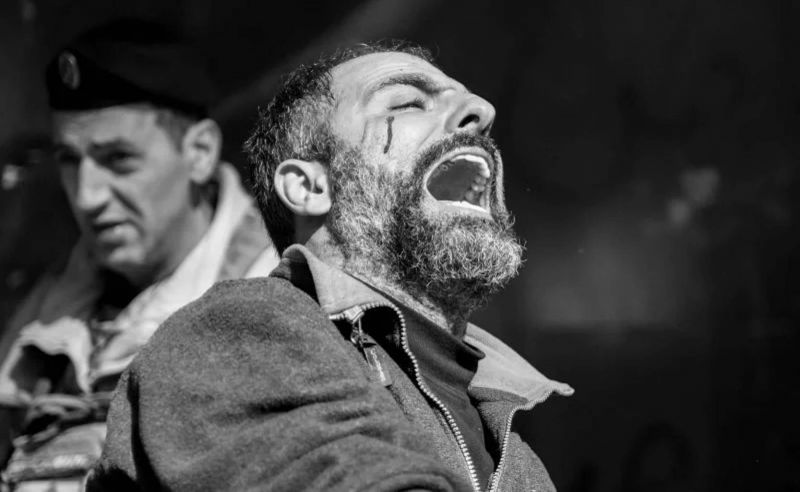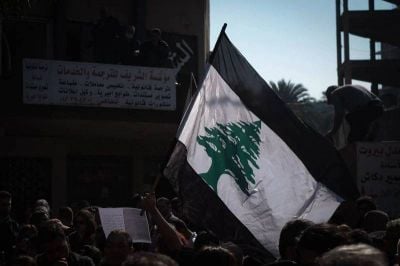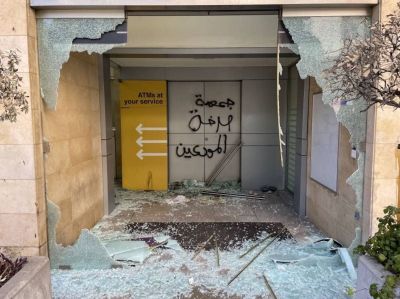
A scene captured during Thursday’s depositors’ demonstration in Badaro, which saw several banks torched and vandalised. (Credit: Mohammad Yassine)
“At what dollar rate do you think the Lebanese will react? When the greenback hits LL100,000? LL1 million? LL20 million?” Mustapha Hamaoui tweeted this question a few days ago, one that is on everyone’s mind.
When will Lebanon’s citizens rise up? Will the outcry of bank depositors, who took to the streets yet again Thursday, be a prelude to long-term action, or will it fizzle out as usual?
Hurt, tormented on a daily basis, humiliated, stripped of their possessions, impoverished as never before and with their health threatened every moment, Lebanon’s citizens have suffered, allowing themselves to be subject to this pain.
Faced with a gradual deterioration of their quality of life, the Lebanese hardly react and when they do, only tentatively. Have we become completely apathetic? How have we tolerated, for almost three years now, what others would accept for more than 48 hours?
“Had the French been stripped of their bank deposits as was done in Lebanon, heads would be severed on Place de la Concorde,” said political scientist Karim Bitar, and director of the Institute of Political Science at Saint Joseph University.
The historic Oct. 17, 2019, uprising rekindled a core of Lebanese disobedience that runs deeper than [religious] affiliation, but since then nothing seems to have shaken them out of their torpor.
With the exception of a few anger outbursts of limited duration and effect — sporadic road closures illuminated by burning tires, rallies that wither after 24 or 48 hours — no real, long-term action has been initiated. What is preventing the people from turning the tables on their oppressors and ending this descent into hell?
The many faces of criminality
“The main problem is that it is impossible to demonstrate in the face of a political regime that does not want to listen, a criminal regime in itself,” said Albert Moukheiber, a clinical psychologist and neuroscientist.
For Moukheiber, this criminality lies not only in the excessive violence that security forces used in repressing the 2019 uprising, which saw riot police targeting the eyes of dozens of young people with live rounds, but in the systemic criminality at all levels of the Lebanese state.
It is a criminality of “white-collar criminals,” he said, with oligarchs’ stranglehold on the national banking system and economy. It is the venality of “third-rate criminals” who use assassination to reinforce their influence on the lives of citizens.
“The balance of power is not at all like [that] seen in other countries,” explained the psychologist, who is convinced that the Lebanese people are suffering more from powerlessness than from resignation.
This did not prevent them from taking to the streets on several occasions, often in a sporadic, unorganized manner, to protest or to make specific demands.
There are multiple examples of a popular will to make change happen — including the march for secularism, the October 2019 uprising, demonstrations for specific women’s and children’s rights, the You Stink Movement during the waste crisis of 2015 and protest against child marriage.
While these actions could only achieve small gains, they helped foster a culture of advocacy for civil rights and an awareness of citizens’ right to express themselves through public action. That culture was severely fractured by the deadly Beirut port explosion of Aug. 4, 2020.
This tragedy threw Lebanese back into a bloody past that continues to fester, a wound repeatedly reopened, a compounded, unhealed trauma.
“It would be inappropriate,” said Moukheiber. “It would be unbelievable not to have traumas. It would be crazy to continue to live as if nothing happened.”
For those of a certain age, the port blast resurrected the people’s worst wound. “The Lebanese suffered the [Civil] War that began in 1975, [which was] never rethought, never revisited, never judged,” said Joseph Maïla, sociologist and professor of international relations at ESSEC in Paris. “Only its main protagonists have been amnestied.”
Lebanon’s two decades of civil unrest was followed by a series of external and internal conflicts punctuated by a series of dark political assassinations in the 2000s.
These were onerous and “repeated physical assaults,” said Maïla, worsened by the “symbolic violence represented by the contempt for the death of [average] people.” These criminals “never repented, and are unforgiven.” Their cynicism is prevalent.
“Their persistence in power,” he said, “is an insult.”
All this has been corrosive to Lebanon’s body politic, but it has also toughened up its citizens, who are persistently praised as “resilient,” a fortitude its political class has severely tested.
“The Lebanese people emerge shaken by a systemic instability and an impossible daily life that is now chaotic and dismembered. They are [Lebanon’s is] now a ‘brutalized’ society,” added Maïla, quoting George Mosse, the German-American historian best known for his studies of Nazism.
A Lebanese paradox
Optimists maintain that Lebanese have not forgotten their unfinished uprising. They are making do with the means at hand. The COVID-19 pandemic was accompanied by, “a counter-revolutionary virus that gave oxygen to the political class,” Bitar recalled, [while] the economic crisis undermined citizens’ remaining energy and determination.
“Their revolts are necessarily cyclical, given the major economic, social and symbolic precarity,” said Maïla, pointing out that humans cannot permanently focus their attention on action.
The recent resurgence of the Beirut port blast investigation — provoked in part by the judiciary’s harassment of William Noun, the young brother of a blast victim, and of the probe’s investigating judge, Tarek Bitar — did not provoke the hoped-for storm of protests.
A hundred-odd supporters of the cause, including victims’ families and a few political figures who entered the extremely polarized landscape, politely returned to the street for a few hours, then retreated.
Popular struggle is made difficult, almost impossible, in the face of a criminal system that is more resilient than its individual citizens, a state that shelters the warlords who helped devise Lebanon’s post-Civil War political settlement.
“The Lebanese paradox is that we have one of the weakest states in the world but one of the most powerful systems,” Bitar said. It is a system that is all the more impervious to change and reform because it was erected on the foundations of a fossilized sectarianism, whose primary job is to divert attention from fundamental issues and block accountability.
Karim Bitar uses the term “mithridatism” to describe Lebanon’s political system. It consists of administering slow poison to the point that the citizenry become unable to react. The political class has thus succeeded in weakening citizens. Like the frog placed in a pan of lukewarm water heating on the fire, Lebanon’s citizens grow accustomed to the mounting heat before quietly expiring.
Hitting rock-bottom
Beyond this pessimistic vision, a complementary explanation for the pronounced lethargy of Lebanon’s citizenry may be found in psychology.
Faced with recurrent trauma, people are simply depressed. “When you try to do something over and over again and you don’t succeed, you fall into a depression that is not pathological,” said Moukheiber, “but rather adaptive.”
Depression is not resignation, he believes. There are always latent energies awaiting for the right occasion.
“We are faced with the cruel paradox of a moral indignation which, of course, continues,” said Maïla, “but it is coupled with a persisting political hopelessness.”
This helplessness arises not only from a tough, unyielding and corrupt political system, but to problems inherent to Lebanon’s culture, the Lebanese mentality. Known for their individualistic nature, Lebanese people find it difficult to engage in long-term collective action, and especially to form groups, other than the sectarian and family groupings prevalent in the polity.
Maïla drew attention to a “subtle combination of [sectarianism] and ego rivalry,” often observed within the protest movement, and among MPs emerging from it.
Lebanese activists’ failure to organize themselves politically through parties, alliances and strategies, Maïla believes, is a symptom of this sense of helplessness. “So, there is no substitute for politically, nationally, collectively organized action.”
Humiliation, Bitar recalled, is a matter of history more than one of poverty. The persistence of the Lebanese people’s misfortune is made more vivid by “the pain of memory and biting contempt. In fact, both remembrance and dignity [are] treated with scorn.”
It is still necessary to activate this pain and anger — always present due to the ambient sense of humiliation — while rethinking Lebanon and political action in a long-term perspective.
“Maybe we have to get to the abyss,” Moukheiber said, “to touch bottom to rise to the surface.”
This story originally ran in French in L’Orient-Le Jour, translated by Joelle Khoury.

